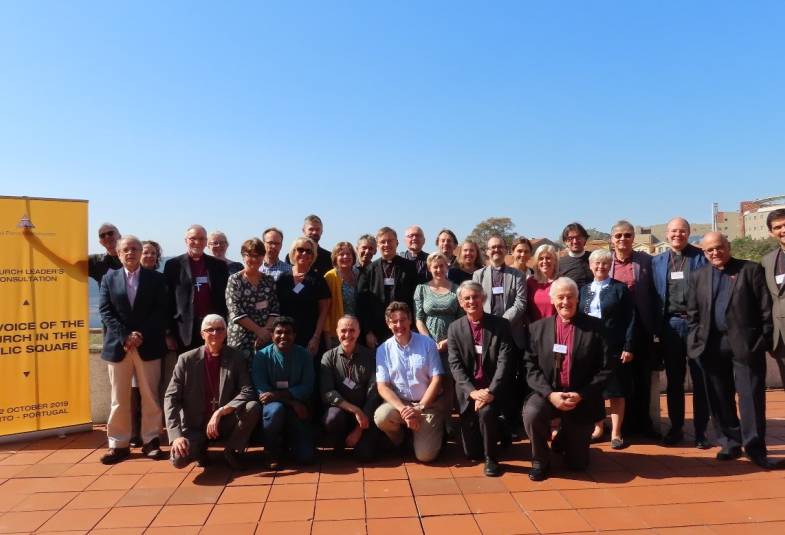
Porvoo Communion Church Leader’s Consultation and Meeting of the Porvoo Contact Group
“The Voice of the Church in the Public Square”
Porto – 10th-12th October 2019
Communiqué
Representatives of the Churches of the Porvoo Communion gathered in Porto, Portugal between 10 and 12 October 2019 for a consultation entitled ‘The Voice of the Church in the Public Square’. The consultation took place at the Seminário de Vilar in Porto where delegates were made welcome by the Rt Revd Jorge Pina Cabral and the Lusitanian Catholic Apostolic Evangelical Church. The relationship of communion between our churches was grounded and made visible in our gathering together for prayer, celebration of the Eucharist, debates and fellowship. Bishop Sifredo Teixeira from the Methodist Church and Bishop Armando Esteves Domingues from the Roman Catholic Church participated in the conference on one afternoon and brought greetings from their churches.
The Consultation took place shortly after the death of the Rt Revd Dr Tore Furberg, sometime Bishop of Visby in the Church of Sweden and Lutheran Co-Chair of the conversations that led to the Porvoo Agreement. We gave thanks for his ministry and the legacy he leaves.
Throughout the consultation we heard and reflected on issues relating to the Church in the Public Square. The Most Revd Dr Michael Jackson, Archbishop of Dublin and Bishop of Glendalough began with a paper entitled ‘Secularism: confused friend or active foe?’ He argued that secularism grew out of the European enlightenment and gave honourable voice to the political will and decision of the people. Secularism has, however, moved into a new situation and needs today to rethink its role in a post-secular age as much as religion does. He argued that a new dialogue is needed, without the language of the victory of one view over the other.
One way of being present in the public square was described by Adrian Harris, Head of Digital Communications in the Church of England, who talked about digital presence. He explained the importance of a strategy of engaging with the worldwide web and social media in a culture where people spend increasing amounts of time online, with a view to enabling people to make contact with church life at a local level. The Church’s new strategy shows how the Church can move from being pre-secular to post-secular.
Lutheran contributions from the Revd Professor Cristina Grenholm from the Church of Sweden and Dr Sven Thore Kloster from the Church of Norway posed questions about the nature of the Church’s involvement in the public square, drawing on the Lutheran doctrine of the two regimes and on practical examples of churches addressing difficult political issues either through seeking consensus or recognising diversity.
A special panel discussion dealt with European relationships with a focus on Brexit. The panel consisted of the Revd Helene Steed from the Church of Ireland, the Revd Dr Ainsley Griffiths from Church in Wales, Ms Miriam Weibye from Scottish Episcopal Church and Dr Rachel Jepson from the Church of England. The panel explained the very different views about Brexit prevalent in the UK: church communities are divided and the issue is complex. Those present agreed that relationships between churches can transcend divisions and borders.
The consultation was fortunate to hear from Mr Antonio Marujo, an experienced Portuguese journalist who gave his perspective on the public square in Portuguese society. The religious landscape of Portugal is diverse, but with a dominant Catholic Church. There were expectations among the public that the churches should make a contribution to public discourse and that the churches had to speak. Mr Marujo gave examples of where the churches had contributed in the public debate but also when the churches had declined to speak.
Ms Lena Kumlin and the Revd Dr Tomi Karttunen gave a presentation on the Church of Finland’s profound work on climate change, built on a foundation of Christian theology and ethics. The goal of the Church’s energy and climate strategy was a carbon neutral church by 2030. The Church takes into account the consequences for the environment and climate when developing its business. The Church’s environmental diploma provides an opportunity for parishes to plan their activities in an environmentally friendly way. Environmental and sustainability issues are playing an important part in Finland’s outworking of its presidency of the European Union.
The Porvoo Communion Church Leader’s Consultation concluded with a visit to a Lusitanian parish for evening prayer followed by dinner and cultural evening. The Porvoo Contact Group expresses its gratitude to the Lusitanian Catholic Apostolic Evangelical Church, to the Rt Revd Jorge Pina Cabral, the Revd Sérgio Alves, Ms Catarina Sá Couto Mr Richard Domingues and Mr José Sequeira for making members so welcome to Seminário de Vilar and the city of Porto. The Group looks towards its 2020 meeting: a theological conference hosted by the Church of Sweden.